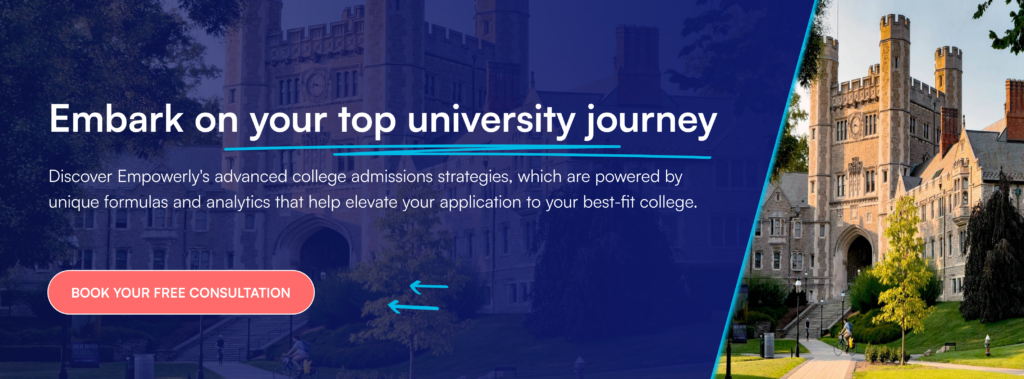A college interview can feel intimidating and scary at first. You might even be thinking, “I just submitted a whole stack of information about myself! What else could they possibly want to know?” But the student interview, if offered, is one of the best ways to stand out as the real person behind your college application.
And, let’s face it — in today’s age of AI-generated content and endless robot profiles, your humanity has never mattered more.
So what are we in for?
A college interview is meant to be a conversation, not a high-pressure interrogation. The interviewer, who might be an admissions officer or an alumni volunteer, will ask you questions about things you can’t easily put on a resume, or why you’re interested in their specific school. No matter the questions, some preparation will help you shine on the big day.
But before we go any further, let’s clear the air:
When we talk about interview prep, it isn’t about putting on a mask or pretending to be someone else. That’s the opposite of what we want. Instead, taking time to thoughtfully prepare for your college interview can help you feel more confident, more natural, and more ready for any question that comes your way. This confidence translates into a great first impression — and that’s our ultimate goal.
Join us! This guide will break down the process of preparing for your first college interview so you know what to expect and how to bring your best self to the table.
5 simple steps to prep for your first college interview
So, you received the email or letter inviting you to schedule an interview with a college. What does it mean? You’ve never done an official interview before (outside of school clubs), and it’s been a few months since you submitted your application. You’re starting to wonder if you even know what to say…
Don’t panic!
Let’s focus on the good news: an interview request means the college is still considering your application at this stage. While it’s usually not enough to make or break your chances entirely, a particularly strong interview could influence the process in your favor as the admissions officers make their final decisions.
But before you pick a date and jump right in, you should know what you’re getting into — and what your timeline will be.
Some of these conversations are purely evaluative, some are informational, and some are even optional. This video provides a helpful introduction to the concept of college interviews:
Here’s a quick rundown of the most important steps to take before, during, and after your college interviews. Once you know how to get ready, you’ll be one step closer to acing all your student interviews this season.
Step 1: Do your research and practice
When it comes to rehearsing or over-rehearsing your answers, there’s a fine line. Yes, you want to practice, but don’t overthink it. You want to still come across as natural!
What does this mean exactly? You’re not memorizing answers; you’re trying to build familiarity so you can respond with confidence.
For instance, there are several common interview themes you can expect to discuss at some point:
- Why this college?
- What’s a challenge you’ve overcome?
- What’s something you’re passionate about outside academics?
If you’ve already reviewed the main ones, you can find more examples of interview questions on the internet (both common and uncommon).
For practice talking through your ideas, you can try:
- Talking in front of a mirror
- Mock interviews with a parent, counselor, or friend
- Recording yourself and playing it back
When you review sample questions, try to respond as if you were talking to an admissions officer. But you don’t need to write your responses out. After all, the last thing you want is to sound like you’re reading from a script.
And no, you don’t need to spend forever on this. A few productive run-throughs are better than no prep or trying to memorize answers word-for-word.

Step 2: Confirm the interview details
You’ll obviously need to double-check your logistics and plan a ride to get there. But what else do you need to do? Depending on the interview format, you may have different variables to consider.
In-person interviews
First, find out where you’re going; look up the location in advance. If it’s near you, try to visit it once beforehand to get a feel for the place. Regardless of the distance, you’ll definitely want to check traffic, get directions, and leave plenty of buffer time (just in case something unexpected happens).
Virtual interviews
Video or phone call? Test your internet connections or cell reception, camera, and lighting. Download any apps or software you may need, and make sure your device is charged. You’ll also want to find a clean, quiet backdrop for your meeting time.
Once you have the meeting details, create a calendar invite with reminders, including who you’re meeting, location or link, and time zone adjustments. Don’t let a mix-up hold you back.
Step 3: What to wear (and how to show up)
“What should I wear to a college interview?” is one of the most common questions we hear from students. Here’s the answer!
On the day of your meeting, dress professionally — business casual is often preferred. Your goal: not too formal, or too casual, and still comfortable being yourself.
Now, “business casual” is an interesting balance, but we’ll give some examples:
- Pulling out a ball gown or tuxedo will make you feel weird.
- The same goes for showing up in your old pajamas.
- What works: a nice blouse or shirt, simple slacks or skirt, clean custom shoes.
What else?
Try to figure out the weather in advance, so you can be prepared. When in doubt, wear (or bring) layers. Avoid loud accessories, overly flashy patterns, or anything that you tend to fidget with — it will end up distracting from your words.
If you’re still worried about it, try on the outfit the night before, and get feedback from someone you trust. Dressing up well (even for virtual calls) will help you get into the mindset of performing well, and confidence is the goal.

Step 4: Bring notes — but don’t rely on them
As we mentioned earlier, prep is positive: you definitely want to do your research and prepare a few answers and questions. But you don’t need to script everything. In fact, writing everything out is a waste of your time — and might tempt you to read off the paper or force the direction of the conversation.
There are two types of notes you’ll probably want to have on hand when in walk into the interview itself:
- What you want to say: talking points with specifics about your interests, passions, and “why this college” reasons.
- What you want to ask: genuine questions for the interviewer about student life, academic programs, or school culture.
Here are a few examples of questions you might ask:
- “What do students tend to love most about this school?”
- “How would you describe the campus culture?”
- “What’s one thing you wish you had known before attending?”
Beyond that, it’s best to trust your own personality and knowledge. It’s far better to demonstrate curiosity and engage with the conversation as it flows, not just answer direct questions. (And if you blank out, it’s okay to pause and collect your thoughts, if you need to.) After all, the subject of the interview is you, and that’s one topic you can be confident you’re an expert at.
Step 5: Send a thank-you note after
It’s not only courtesy, it’s considered pretty much the norm — so definitely ask for an email address before you leave. A genuine thank-you note shows maturity, gratitude, and professionalism. Skipping it conveys that you weren’t that invested, or didn’t reflect on it afterwards.
But a thoughtful thank-you note isn’t just good manners — it’s a chance to leave a lasting impression, jog their memory, or reinforce why you’re a good fit.
Need a template? Here’s a starting place:
Dear [Interviewer Name],
Thank you for taking the time to speak with me about [College Name]. I especially appreciated hearing about [specific detail]. Our conversation made me even more excited about applying, and I hope to join the [school mascot/team/department] community.
Best regards,
[Your Name]
It doesn’t need to be a huge, long letter — it’s much better to keep it short, genuine, and typo-free. You’ll want to send it within 24-48 hours of your actual interview so you are fresh on the interviewer’s mind. If you felt a strong connection with your interviewer, that’s great. In your follow-up note, mention one thing that stood out to you, or that you’d love to follow up on. The personal touch means everything.
This video provides a few tips for a great interview, including how to send a thank-you note that admissions officers will approve of:
Other reminders for a great interview
Should I bring a resume?
You can bring one, but don’t expect the interviewer to take it. They have most likely reviewed the main points of your profile already (or have your application materials in front of them). Besides, the primary purpose of the interview is to go beyond what’s on paper and delve deeper into your personality, motivations, and interests.
Can I bring a parent to a virtual interview?
No, you should not have a parent with you during a college interview — virtual or otherwise. The interview is a one-on-one conversation between you and the interviewer. Having a parent there, even if they aren’t speaking, can be distracting and may make you appear less independent. The college wants to hear your voice and learn about your experiences and perspectives.
It’s okay to have your parents nearby for moral support before and after the interview, but during the interview itself, you should be in a private, quiet space where you can focus entirely on the conversation.
What if I don’t know the answer?
It’s more than okay to take a pause and collect your thoughts. It may seem like the silence is stretching on forever, but it’s probably just in your mind; conversations have a natural ebb and flow, and you don’t need to micromanage each moment. Most importantly, stay calm, and don’t make something up just to fill the air space.
Your first college interview: a step towards the future
Your college interview isn’t a test, after all — it’s an opportunity to show who you really are beyond the application. Even if it feels nerve-wracking now, preparing makes all the difference.
Want to run through a mock interview with a pro, or get feedback on your responses? Empowerly’s expert counselors are there to help. Don’t go in unprepared; schedule a session today.
